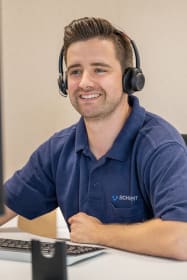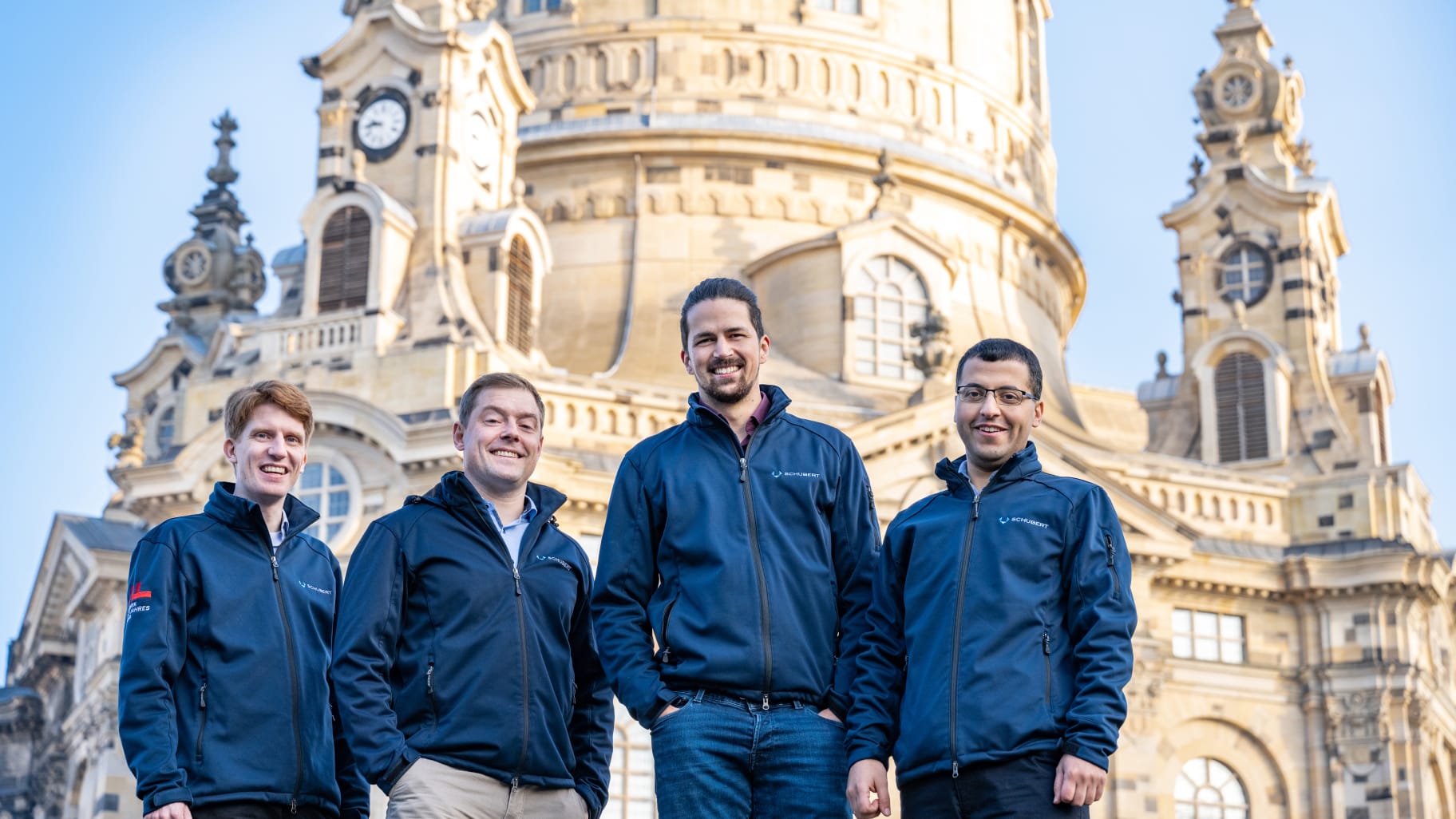
Michael Döring, Head of Schubert Motion, in Dresden.

Vincent Modes has been with Schubert Motion since 2022 and is enthusiastic about the company’s family atmosphere.
A small team works on development at high speed
The development of the motion software represents the first milestone which the team had set for itself and has largely already achieved. With this AI-controlled software, the movements of Schubert’s packaging robots become more organic and can be optimised for speed, significant vibration reduction and even energy efficiency. In 2023, the software is scheduled to go into series production in the F2 robots. And further robot types are in the pipeline. The Dresden colleagues complement each other in their areas of responsibility and work together closely. “The exciting development projects and the small team make the job especially interesting,” says Florentin Rauscher. Vincent Modes can only agree: “As a result, areas of responsibility are more far-reaching, hierarchies are flatter and we are in direct contact with our users, our Schubert colleagues from the Crailsheim headquarters.”
The team members are all very enthusiastic about the very direct practical relevance of their work. Being able to test and present their theoretical ideas in real time on real robots in a packaging machine is indeed very unique – especially when it works as well as it does with the robots at the Fachpack. Working very close to the machines not only strengthens motivation, it is also an essential part of the cycle for Michael Döring. A permanent flow consisting of “programming – testing – simulation – performance in the machine – analysis” advances the developments at Schubert Motion. But the objective is something else, he says: “We are working on obtaining comprehensive, direct and automated feedback on the optimised robots and the machine in the future: from commissioning all the way through to use by our customers. We can then feed the results back into ongoing improvement. We are ideally positioned to achieve a high development speed and can continuously validate and optimise developments.”
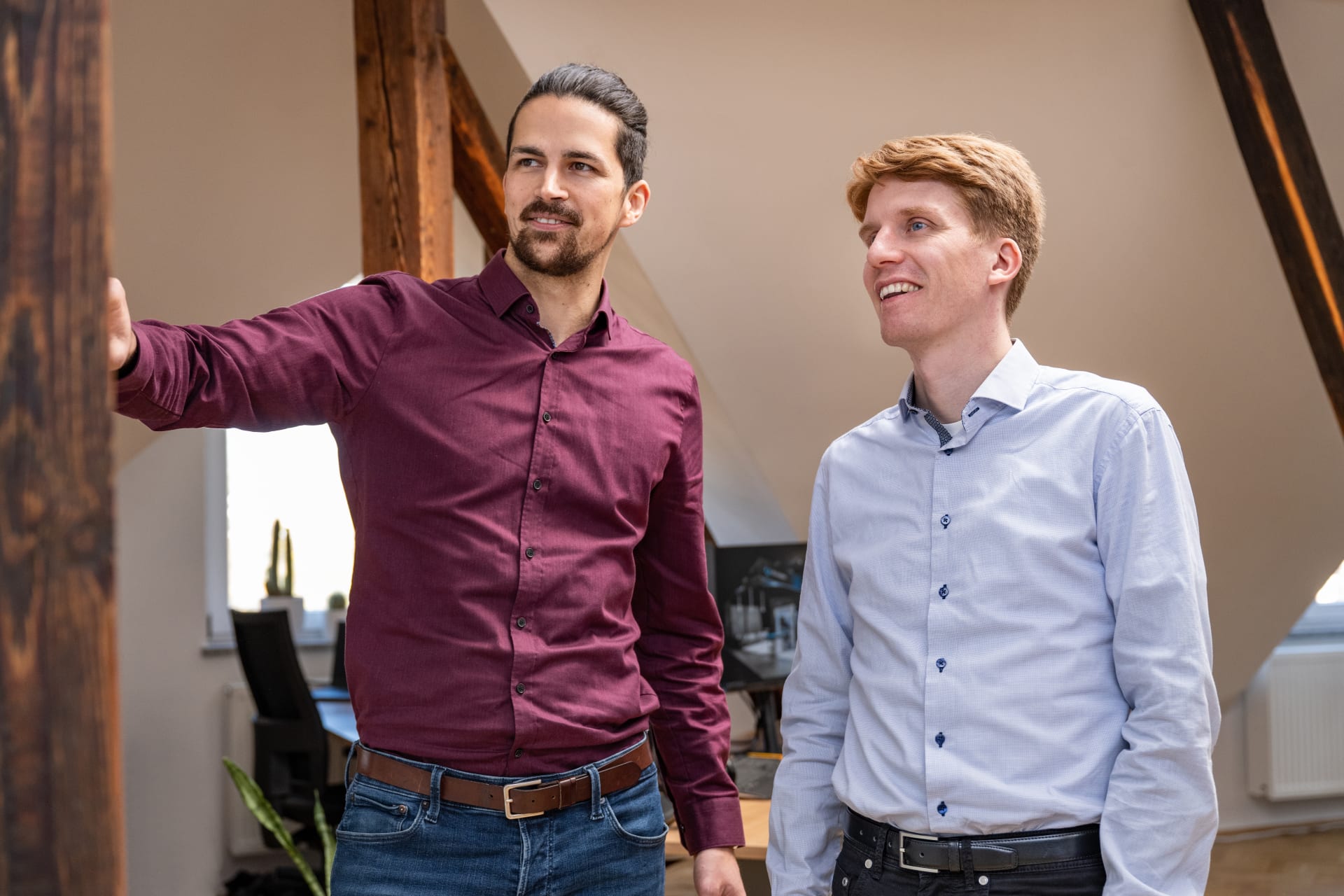
For Florentin Rauscher (left), here seen sharing ideas with Vincent Modes, exciting development topics such as optimising the movement of robots make the job at Schubert Motion uniquely interesting.
A focus on optimising packaging processes
The range of assignments at Schubert Motion relating to packaging robots and processes is far-reaching and exceptionally varied. Teaching neural networks using AI methods, so-called machine learning, is just as much a part of this as software development in the control context. Michael Döring is also involved in development processes at Schubert, for example for new machine generations. This is where he contributes his robotics experience: “With simulation and optimised movements, we can source a clear picture of the optimisation potential and can then make meaningful decisions. We will also become even faster with commissioning in the future.” So-called condition monitoring, in which the loads on the robots are monitored, is heading in the same direction, as is the performance of sophisticated FEM calculations (finite element method), for example, for mapping and optimising packaging processes without robots.
This task is the responsibility of Imadeddin Zreid, who contributes his experience in complex multi-physical FEM simulations and their scientific methodology: “FEM simulations on the forming shoulder and robot simulations are very different at first glance, but it is amazing how significant the overlaps are,” he explains. Imadeddin Zreid is currently working on the simulation and optimisation of forming shoulder geometry in Schubert’s Flowpacker. “Basically, we are also looking at geometric points that we define and optimise, similar to the movement optimisation of the robots. Only now, they lie on a predefined surface – the complex structure of the forming shoulder. In motion optimisation with Motion, on the other hand, they lie on a free trajectory between the start and end points of the robot’s movement.” Simulations alone, however, are not enough. The results are of course also checked and confirmed in real-life experiments. Imadeddin Zreid is especially pleased about the possibilities of 3D printing, among other things via PARTBOX: “Holding the very first forming shoulder to be printed in-house in my hands was very exciting.”

Imadeddin Zreid brings his scientific expertise to FEM simulations.
Ongoing dialogue with Crailsheim
Michael Döring adds: “It is important to be effective with a small team. We achieve this by working in a way that is very agile and with an open working atmosphere, in an office environment that is just as open. This is enhanced by practical experience and the scientific perspective that is strongly anchored in the team. We approach problems with both state-of-the-art tools and established methods, including those from robotic development. And we incorporate scientific methodology. We can also transfer our approaches from motion software to other development areas. The methods and experience for problem solving in a scientific context help us move forward in many areas.” Vincent Modes is also pleased with the agile teamwork: “We exchange ideas very regularly, reflect on where everyone stands with their assignments, whether the goals set have been achieved and give our colleagues feedback on their projects. The collaboration with Crailsheim is also very close, especially when it comes to carrying out tests on machines or providing technical support.” Schubert Motion also offers students at the nearby Technical University exciting industrial assignment projects.
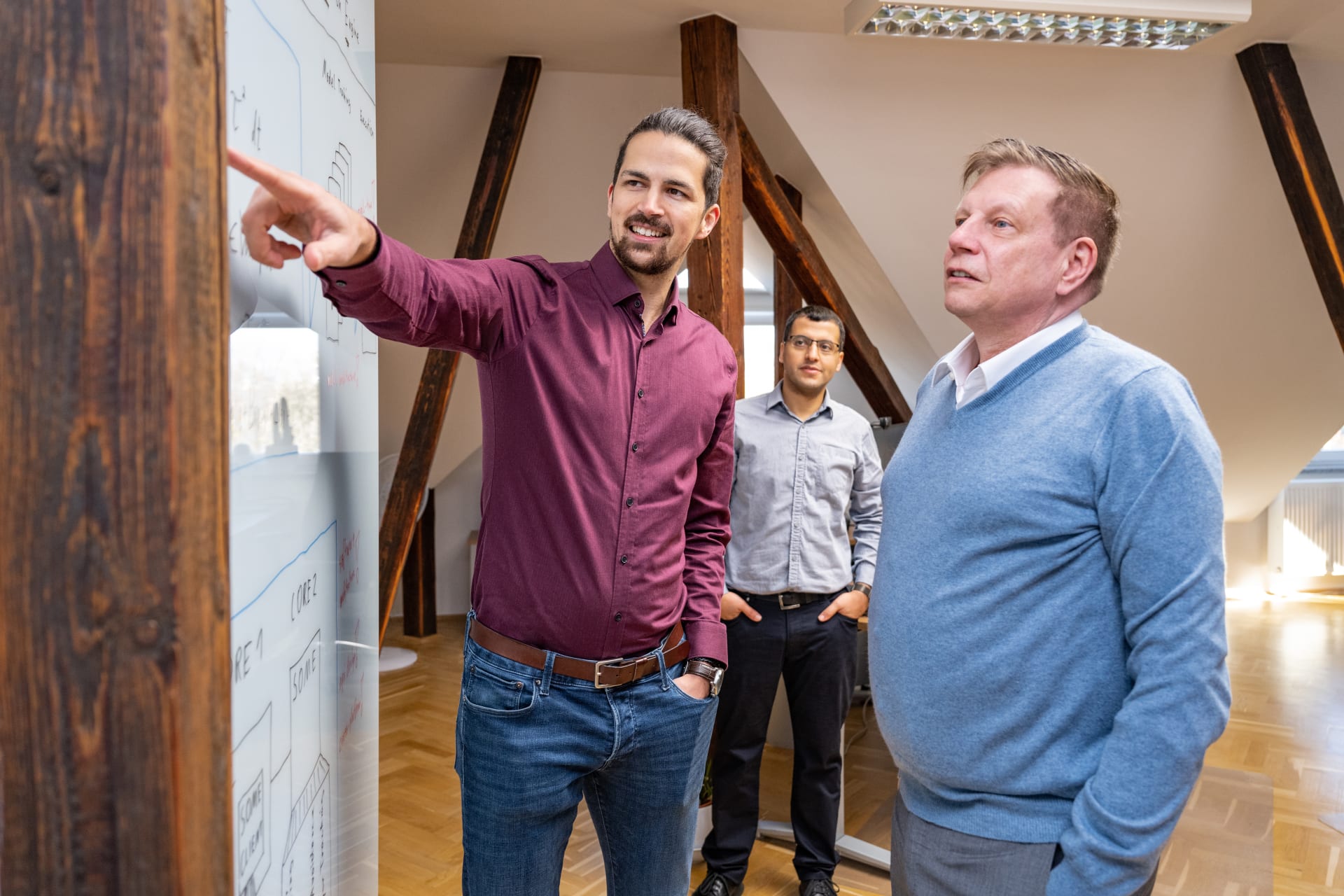
Communication between Crailsheim and Dresden is frequent and close: Managing Director Ralf Schubert (right) visiting Schubert Motion.
Innovations for greater sustainability
A key aspect of the current projects at Schubert Motion is to make the packaging world more sustainable and therefore future-proof. In the context of Schubert’s Mission Blue sustainability strategy, energy-efficient robots and predictive machine maintenance have a clear impact on resource-saving, environmentally friendly packaging processes. Florentin Rauscher has evaluated the potential: “When we use motion software, we can optimise robot movements for energy efficiency rather than maximum performance.” Michael Döring adds: “On average, this can result in an energy-saving advantage of between ten and 20 per cent.” In addition to fast movement, monitoring the robot units in the field is also important for sustainability. It can help make the AI-based software even better and reduce unplanned machine downtime through condition monitoring and preventive maintenance.
To this end, the experts in condition monitoring dive deep into the robots’ data to monitor the condition of system components and to determine parameters or limit values for preventive maintenance. Here too, simulations help determine the internal status of the robots under different conditions. This work provides an important basis for analyses provided to the customer on the Schubert customer portal with the help of CARE services. For example, to obtain a detailed view of the required future maintenance work. Schubert Motion works closely with the Crailsheim department responsible for the recording and processing of machine data for this purpose. “This enables us to combine our scientific orientation with the concrete problems in the real production environment,” says Michael Döring.
This is where it becomes apparent why machine manufacturer Schubert invests a large budget in research and development every year. In-house expertise enables the company to offer a complete package of perfectly coordinated solutions – from individual machine components to the processes at the customer’s own production site. “We strive to continuously improve everything we do,” Michael Döring sums it up.
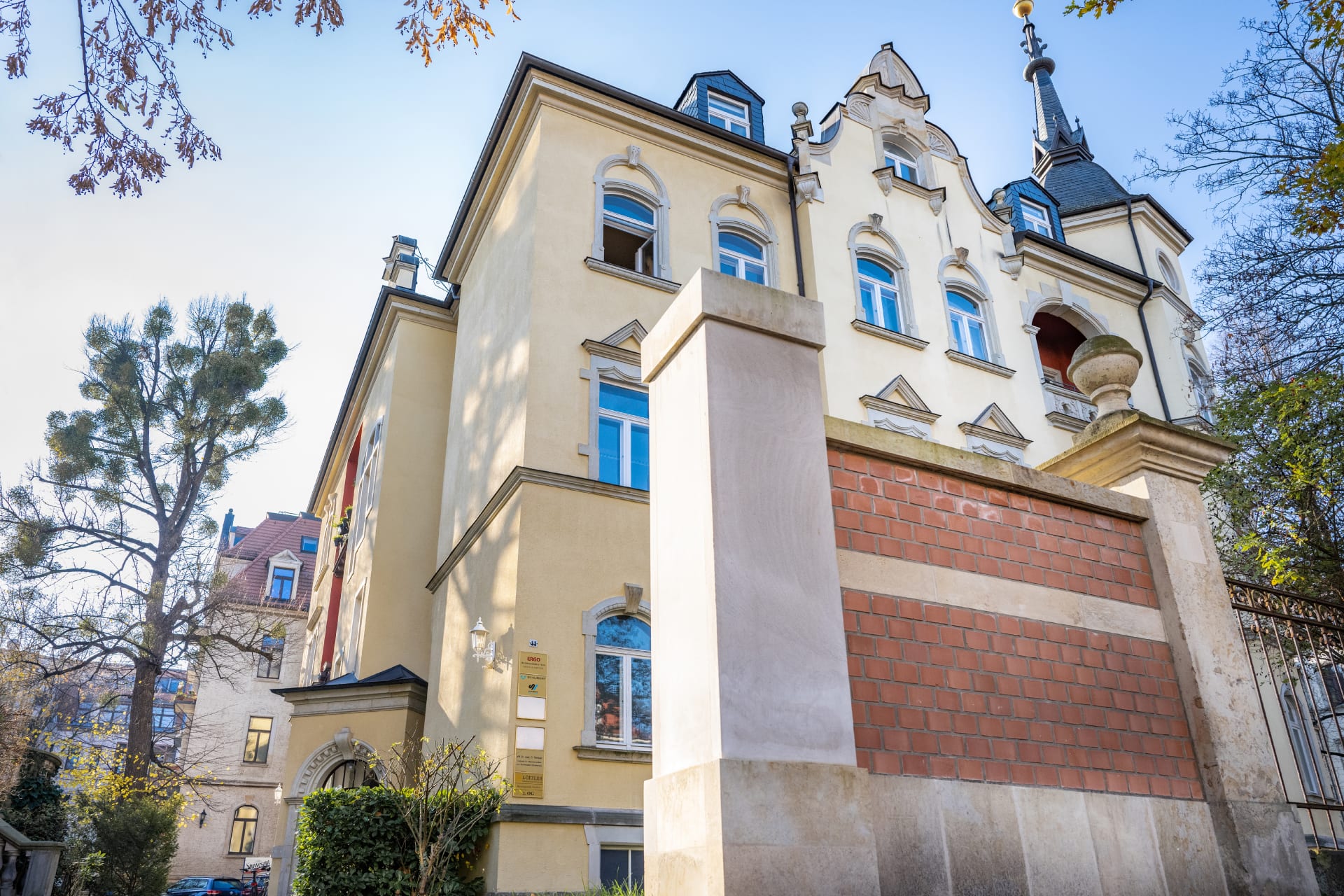
Schubert Motion’s office is located in Villa Eisinger, a well-known historic Dresden building in a central city location close to the Technical University.
